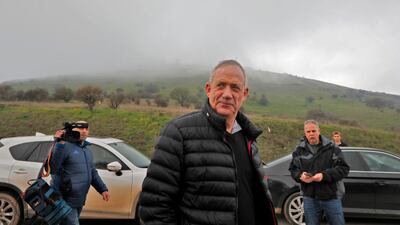Israeli Prime Minister Benjamin Netanyahu’s main election challenger Benny Gantz has vowed to enact a policy of “separation” from the Palestinians in the occupied West Bank and occupied East Jerusalem.
His centrist Blue and White party was launching its election platform on Wednesday. It said that once in power it would confer with Arab states "and intensify the process of separation from the Palestinians, while ensuring an uncompromising commitment to Israel's national security".
The move is a risky strategy in the Israeli political spectrum with Mr Netanyahu surviving four terms based on his policy of not ceding land to the Palestinians, as have his fellow right-wing politicians.
The policy blueprint envisages Israel retaining control of the Jordan Valley and blocs of Jewish settlements in the West Bank but remains hazy on what might be done with more isolated outposts in territory captured in the 1967 Middle East war.
Pressed on this, Lapid told Israel's Ynet TV: "I believe that, in separating from the Palestinians, we will ultimately arrive at two states. But no responsible politician would get into details before the Trump plan is presented."
US President Donald Trump is widely expected to make public a peace plan after the Israeli election.
Asked if Mr Lapid's remarks reflected Blue and White policy, a party spokeswoman said she could not elaborate on the platform.
Opinion polls give Blue and White around 35 of parliament's 120 seats against 30 for Netanyahu's Likud party.
The Palestinians were circumspect.
"What does he (Lapid) mean by a state?" asked Wasel Abu Youssef, an official in the umbrella Palestine Liberation Organization.
"We want a Palestinian sovereign state on the 1967 borders, with East Jerusalem as its capital, empty of settlements, with territories that are connected, not isolated."
In 2009, pressured by the Obama administration, Netanyahu said he would accept a Palestinian state under several provisos. But with U.S.-sponsored peace talks stalled since 2014, he has shifted tone, vowing never to uproot West Bank settlements.
"A Palestinian state would endanger our existence," the prime minister said in speech last month. "This is what they (Gantz and Lapid) are planning to do. They obscure it. They hide it."
Most world powers deem the settlements illegal and support independence for the Palestinians, who want statehood in the West Bank and Gaza Strip, with East Jerusalem as their capital.
Israel pulled settlers and soldiers out of Gaza in 2005. It annexed East Jerusalem after the 1967 war, in a move that has not won international recognition, and regards all of the city as its capital. Blue and White echoed this position in its platform.

